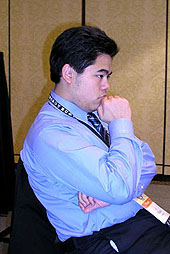Why Nakamura’s Victory is Good for Chess
Most of the chess world knows that America has a new chess champion? and not a moment too soon! This badly-needed result will provide a shot of adrenaline to chess in a country searching for new heroes. Well? Hikaru Nakamura has become that new hero. On December 5th, Nakamura beat Alexander Stripunsky in a playoff to win the U.S. Chess Championship becoming the youngest player to win since Bobby Fischer.

GM Hikaru Nakamura, 2004 U.S. Champion
Comparisons with the living chess legend are unavoidable for Nakamura since he has broken many of Fischer’s records. However, it is with great hope that the young champion refuses to become a lightening rod for criticism against Fischer. That would be an unfortunate role to play for a 17-year old and one that will only bring him additional pressures and inevitable publicity mistakes. Nakamura would do good to avoid these issues.
Why is Nakamura’s victory good for chess? Below are some reasons:
Reasons?
1. Nakamura loves the game and his enthusiasm shows. This is not true in observing many of the top players in the U.S. Many of the top players are aloof, unapproachable, and intoxicated with self-importance? in their own world.
2. Nakamura is a fighter and relentless in his quest for excellence. He works hard, but he admits mistakes. In addition, his chess energy is prodigious. (Note: It was reported by Mig Greengard that after his Championship victory that he played game after game of 1-minute chess against all comers in a hotel lobby!) Not being afraid to put one’s pride on the line is the mark of a champion.
3. He is not involved in chess cliques which can result is short or pre-arranged draws (or games), the bane of competitive play.
4. He has youthful exuberance and confidence on his side. This is inside of a sport enamored with prodigies and young phenoms.
5. Nakamura is a home-grown talent and brings marketing credibility to the table. He does not have any language or accent barriers that prevent many top players from being a spokesperson for U.S. Chess. He also has a great name! The possibilities are endless.
6. He has an interesting family history. He was born in Japan, arrived in the U.S. at age two and has a Sri-Lankan stepfather (FM Sunil Weeramantry) who is not only a nice guy, but a strong chessplayer and a famous coach. You can’t lose.
7. His fan base has exploded around the world including a loyal following at the Internet Chess Club (ICC) ? particularly after the FIDE Championships in Libya. Nakamura is one of the few Grandmasters who will watch a game on the ICC and interact intimately with players well below his strength.
8. Ironically, some controversy is a good thing. Nakamura has had minor chess controversy in his background which makes for interesting story especially since he has transformed himself into a champion. People are often intrigued with these “bad-to-good” stories. He has won the hearts of many early detractors.
9. He appears to want the responsibility to serve as an active ambassador of chess. How far do we have to go back to find the last U.S. champion who WANTED that responsibility?
10. He lives in New York (the biggest market for chess) and will draw attention as well as international chessplayers who will now want to play him. He had already garnered international respect due to his success abroad.
In a conversation with Maurice Ashley, we were discussing his HB Global Chess Tournament and he stressed the importance of having events with a lasting impact. I mentioned the revamped U.S. Chess Championship format and the excitement it has generated this year. He agreed but wondered about the longevity of this excitement. Prior to the Nakamura-Stripunsky playoff, Ashley added that a Nakamura victory would be huge.
Sunil Weeramantry will no doubt take an assessment of future invitations, sponsorships and a host of ideas. Will there be a proposal for a match with Fischer in Japan, or an exhibition with shogi mega-star Yoshiharu Habu? How about a proposal for Nakamura anime chess software? It is doubtful that these ideas will come into fruition, but the point is that there are countless possibilities, most of which will involve him playing against top-flight competition.
His opportunities will come rather fast and because of his attractive style of play, invitations should be plentiful. Regardless of whether or not one believes Nakamura (who turned 17 today) is the strongest player in the U.S., no other player has the upside of this young phenom. We have entered a new chess era.
